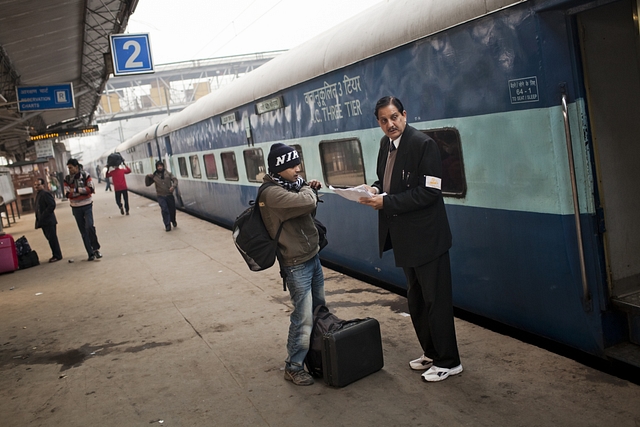
More Than 11 Lakh Railway Employees To get Rs 17,951 Each As Puja Bonus
The Puja bonus, which is being paid for the past four decades, will benefit 11 lakh railway employees.
For the ninth year in a row, Indian Railways employees will get 78-day bonus before Dussehra as the government has approved productivity-linked bonus (PLB) for the year 2019-2020. As many as 16.97 lakh non-gazetted central government employees will benefit.
The decision would enable about 11 lakh railway employees to get Rs 17,951 each, and which will cost the Indian Railways Rs 2,186 crore.
The bonus is usually paid a week before Durga Puja/Dussehra for the past four decades.
However, unlike past years, this year was not a smooth affair as both the major railway unions staged protests against delay in announcing the Puja bonus and threatened strike if their bonus demand was not met.
Since the railway is reeling under severe financial stress due to Covid-19 pandemic, there was some delay in announcing the bonus despite the onset of the festive season.
Railway unions maintain that the bonus to be paid now pertains to 2019-20 financial year, when there was no coronavirus pandemic and the Indian Railways earned profit.
The suspension of passenger train operation began on 23 March this year, just a week before the closure of 2019-20 fiscal. Though passenger service began gradually from May with the launching of Shramik Specials followed by AC specials and other long-distance mail/express specials, the railways suffered heavy revenue loss due to the Covid-19.
"We are aware of the railways financial condition because of the pandemic which has widely impacted the economy of the country. But the bonus demand was for the last fiscal when the railways was fully functional and our workers toiled to make all passengers and freight operations on time,” said AIRF General Secretary Shiv Gopal Mishra.
Justifying the bonus demand, NFIR General Secretary M Raghavaih said: "the over 1,210 million tonnes freight loading and significant passenger bookings in the last fiscal were possible because of the sincere efforts of thousands of railway employees. So the bonus cannot be denied to them because of the current crisis."
Both the leaders thanked Railway Minister Piyush Goyal and Chairman V K Yadav for the decision as they had met them many times to press for the bonus demand.
The PLB on the railways covers all non-gazetted railway employees (excluding RPF/RPSF personnel) who are spread over the entire country.
Payment of PLB to eligible railway employees is made each year before the Dussehra/ Puja holidays. The decision of the Cabinet shall be implemented before the holidays for this year as well.
For the year 2019-20 PLB equivalent to 78 days’ wages will be paid which is expected to motivate the employees for working towards improving the performance of the railways.
Braving the pandemic, the railways continued with the freight service transporting essential goods across the country while pressing more than 1,000 passenger carrying trains including Puja specials into service in a graded manner.
Though passenger earnings are still way behind the target, goods earning has almost equalled last year's level.
"It may be noted that though this payment is being made for last year’s performance, even this year during the Covid-19 period, a lot of hard work has been put in by the railways employees in movement of Shramik Specials, for movement of essential commodities including foodgrains, fertilisers, coal etc and completion of more than 200 vital maintenance projects during lockdown period, which would boost safety and all round efficiency in railway operations," the railways said in a statement.
"Even on the freight side there has been major improvement post Covid-19 lockdown period. Freight speeds have almost doubled now as compared to last year. Freight loading has also increased by 14 per cent for the period of October 2020 as compared to a similar period last year," said the railways.
The payment of the PLB for 2019-20 is expected to motivate the employees for working towards improving the performance of the railways further. The acknowledgement of their work will enhance the sense of inclusiveness and belongingness in the railway families. It is expected to enhance the productivity levels further.